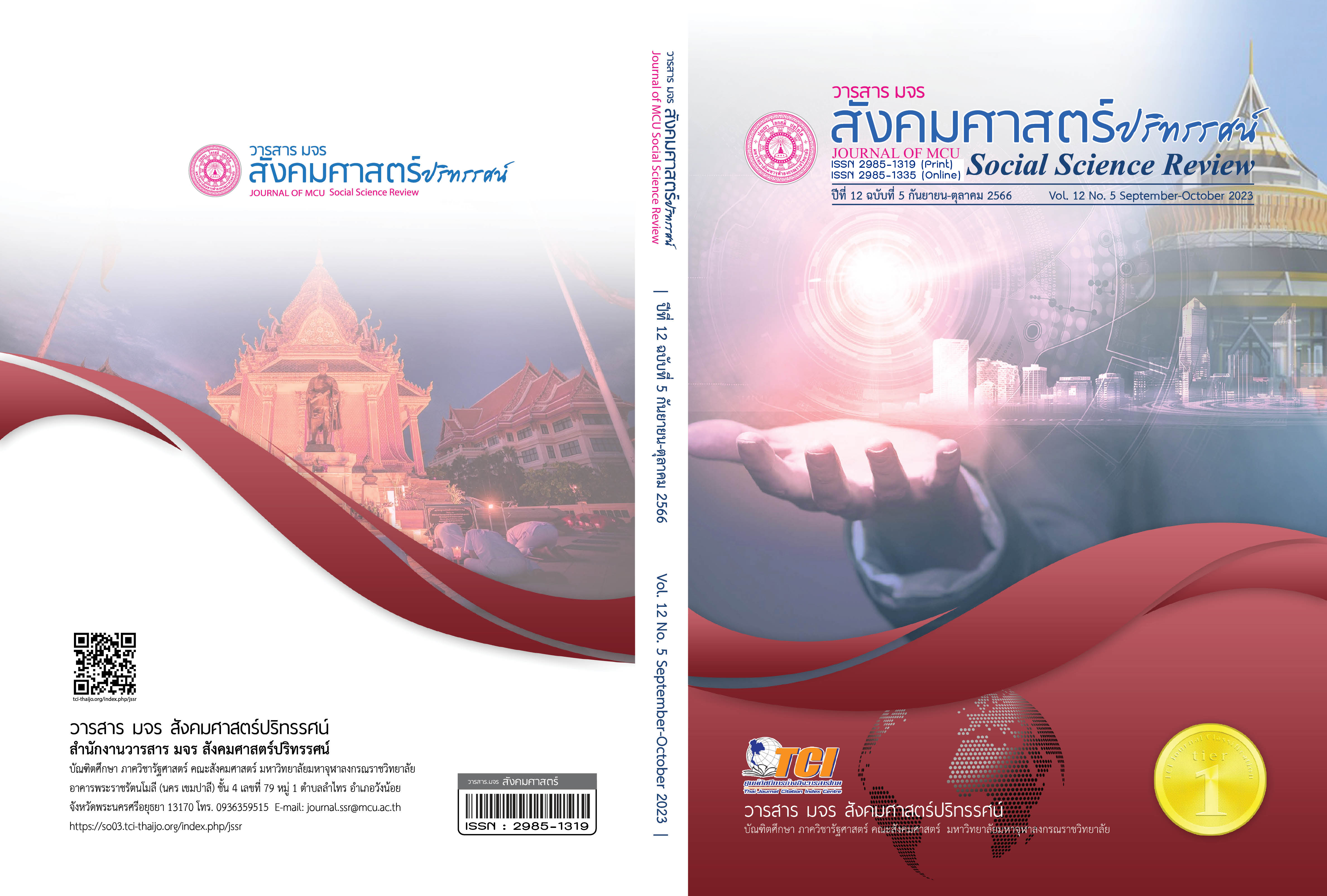พลเมืองดิจิทัล: บทสังเคราะห์องค์ประกอบของพฤติกรรมการเป็นพลเมืองดิจิทัล
คำสำคัญ:
พลเมืองดิจิทัล, เทคโนโลยีดิจิทัล, สังคมดิจิทัลบทคัดย่อ
สังคมดิจิทัลในปัจจุบัน เป็นภาพสะท้อนของการพัฒนาเทคโนโลยีและนวัตกรรมดิจิทัลที่รวดเร็วและมีอิทธิพลต่อการเปลี่ยนแปลงทางสังคม การพัฒนาดังกล่าวส่งผลต่อวิถีชีวิตประจำวันและพฤติกรรมของประชาชน ทั้งในบริบทโลกทางกายภาพและโลกออนไลน์ การทำความเข้าใจถึงพฤติกรรมการเป็นพลเมืองดิจิทัล เป็นกลไกสำคัญในการใช้ชีวิตในโลกดิจิทัลได้อย่างมีประสิทธิภาพ บทความชิ้นนี้จึงมุ่งนำเสนอผลการสังเคราะห์พฤติกรรมการเป็นพลเมืองดิจิทัลที่มีนักวิชาการทั้งต่างประเทศและในประเทศได้นำเสนอไว้ พบว่า พฤติกรรมสำคัญที่เป็นองค์ประกอบการเป็นพลเมืองดิจิทัลมี 5 ประการ ได้แก่ 1) พฤติกรรมการมีส่วนร่วมในโลกดิจิทัล 2) พฤติกรรมการรับผิดชอบในโลกดิจิทัล 3) พฤติกรรมการทำตามกฎในโลกดิจิทัล 4) พฤติกรรมการพัฒนาตนเองอย่างต่อเนื่อง และ 5) พฤติกรรมการเคารพผู้อื่นในโลกดิจิทัล
เอกสารอ้างอิง
กรกนก แขดวง. (2561). ปัจจัยทางจิตสังคมที่เกี่ยวข้องกับพฤติกรรมการเป็นพลเมืองดีบนโลกดิจิทัลของนักเรียนระดับชั้นมัธยมศึกษาตอนปลายของโรงเรียนในสังกัดสำนักงานคณะกรรมการการศึกษาขั้นพื้นฐานในเขตกรุงเทพมหานคร (วิทยานิพนธ์วิทยาศาสตรมหาบัณฑิต สาขาการวิจัยพฤติกรรมศาสตร์ประยุกต์) กรุงเทพฯ: มหาวิทยาลัยศรีนครินทรวิโรฒ.
จุลนี เทียนไทย และคณะ. (2563). อัตลักษณ์ วิธีคิด และชีวิต 4.0 ของชาวดิจิทัลไทย : การสังเคราะห์ผลการวิจัยสู่การใช้ประโยชน์เชิงนโยบาย (รายงานการวิจัย). กรุงเทพฯ: สำนักงานการวิจัยแห่งชาติ.
ฐิตินันท์ ผิวนิล. (2562). มารยาทดิจิทัล: ข้อกำหนดในการสื่อสารออนไลน์ที่พลเมืองดิจิทัลไทยควรตระหนัก (รายงานการวิจัย). กรุงเทพฯ: มหาวิทยาลัยรามคำแหง.
ปราวีณยา สุวรรณณัฐโชติ. (2561) วัคซีนคุ้มภัยคนยุคดิจิทัล : ประเด็นจริยธรรมและข้อควรรู้ทางกฎหมาย. กรุงเทพฯ: จุฬาลงกรณ์มหาวิทยาลัย.
พระราชบัญญัติว่าด้วยการกระทำความผิดเกี่ยวกับคอมพิวเตอร์ (ฉบับที่ 2) พ.ศ.2560. (2560, 10 พฤษภาคม). ราชกิจจานุเบกษา. เล่ม 134 ตอนที่ 10.
วินิจ ผาเจริญ. (2563). การพัฒนาพลเมืองสู่โมเดลพลเมืองที่ตื่นตัวในสังคมประชาธิปไตยของไทย. วารสารพุทธสังคมวิทยาปริทรรศน์, 5(1), 54-65.
วีรวิชญ์ เลิศรัตน์ธำรงกุล. (2564). การกลั่นแกล้งกันในพื้นที่ไซเบอร์ของนักเรียนระดับมัธยมศึกษาตอนต้น: ความชุก วิธีการจัดการปัญหา และพฤติกรรมเสี่ยง. วารสารวิชาการและวิจัย มหาวิทยาลัยภาตตะวันออกเฉียงเหนือ, 11(1), 275-289.
สำนักงานเลขาธิการสภาผู้แทนราษฎร. (2555). พลเมืองในระบอบประชาธิปไตย. กรุงเทพฯ: สำนักงานเลขาธิการสภาผู้แทนราษฎร.
_______. (2564). รายงานผลการสำรวจพฤติกรรมผู้ใช้อินเตอร์เน็ตในประเทศไทย ปี 2564. กรุงเทพฯ: กระทรวงดิจิทัลเพื่อเศรษฐกิจและสังคม.
_______. (2565). รายงานผลการสำรวจพฤติกรรมผู้ใช้อินเตอร์เน็ตในประเทศไทย ปี 2565. กรุงเทพฯ: กระทรวงดิจิทัลเพื่อเศรษฐกิจและสังคม.
เสาวลักษณ์ พันธบุตร. (2560). อยู่อย่างคนร่วมสมัยในยุคดิจิทัล. วารสารวิชาการนวัตกรรมสื่อสารสังคม, 5(2), 161-167.
Choi, M., et al. (2017). What It Means To Be A Citizen In The Internet Age: Development Of A Reliable And Valid Digital Citizenship Scale. Computers & Education, 107(2017), 100-112.
Curran, M. B. F. X., & Ribble, M. (2017). P–20 Model Of Digital Citizenship. New Directions for Student Leadership, 2017(153), 35-46.
Dalton, R. J. (2016). The good citizen : How a Younger Generation is Reshaping American politics. California: CQ Press.
Hooghe, M., et al. (2016). A Comparative Analysis Of ‘Good Citizenship’: A Latent Class Analysis Of Adolescents’ Citizenship Norms In 38 Countries. International Political Science Review, 37(1), 115-129.
Jones, L. M., & Mitchell, K. J. (2016). Defining And Measuring Youth Digital Citizenship. New Media & Society, 18(9), 2063-2079.
Kim, M., & Choi, D. (2018). Development Of Youth Digital Citizenship Scale And Implication For Educational Setting. Journal of Educational Technology & Society, 21(1), 155-171.
Kligler-Vilenchik, N., & Thorson, K. (2016). Good Citizenship As A Frame Contest: Kony2012, Memes, And Critiques Of The Networked Citizen. New Media & Society, 18(9), 1993-2011.
Miller, D., et al. (2016). How the World Changed Socilal Media. UCL Press.
Minciu, M., et al. (2020). New Decision Systems In The VUCA World. Management şi Marketing, 15(2), 236-254.
Mossberger, K., et al. (2008). Digital citizenship. The MIT Press.
Park, J., & Tan, M. (2016). A Policy Review: Building Digital Citizenship In Asia-Pacific Through Safe, Effective And Responsible Use Of ICT. APEID-ICT In Education, UNESCO Asia-Pacific Regional Bureau Of Education.
ดาวน์โหลด
เผยแพร่แล้ว
รูปแบบการอ้างอิง
ฉบับ
ประเภทบทความ
สัญญาอนุญาต
ลิขสิทธิ์ (c) 2023 วารสาร มจร สังคมศาสตร์ปริทรรศน์

อนุญาตภายใต้เงื่อนไข Creative Commons Attribution-NonCommercial-NoDerivatives 4.0 International License.
เพื่อให้เป็นไปตามกฎหมายลิขสิทธิ์ ผู้นิพนธ์ทุกท่านต้องลงลายมือชื่อในแบบฟอร์มใบมอบลิขสิทธิ์บทความให้แก่วารสารฯ พร้อมกับบทความต้นฉบับที่ได้แก้ไขครั้งสุดท้าย นอกจากนี้ ผู้นิพนธ์ทุกท่านต้องยืนยันว่าบทความต้นฉบับที่ส่งมาตีพิมพ์นั้น ได้ส่งมาตีพิมพ์เฉพาะในวารสาร มจร สังคมศาสตร์ปริทรรศน์ เพียงแห่งเดียวเท่านั้น หากมีการใช้ภาพหรือตารางหรือเนื้อหาอื่นๆ ของผู้นิพนธ์อื่นที่ปรากฏในสิ่งตีพิมพ์อื่นมาแล้ว ผู้นิพนธ์ต้องขออนุญาตเจ้าของลิขสิทธิ์ก่อน พร้อมทั้งแสดงหนังสือที่ได้รับการยินยอมต่อบรรณาธิการ ก่อนที่บทความจะได้รับการตีพิมพ์ หากไม่เป็นไปตามข้อกำหนดเบื้องต้น ทางวารสารจะถอดบทความของท่านออกโดยไม่มีข้อยกเว้นใดๆ ทั้งสิ้น





